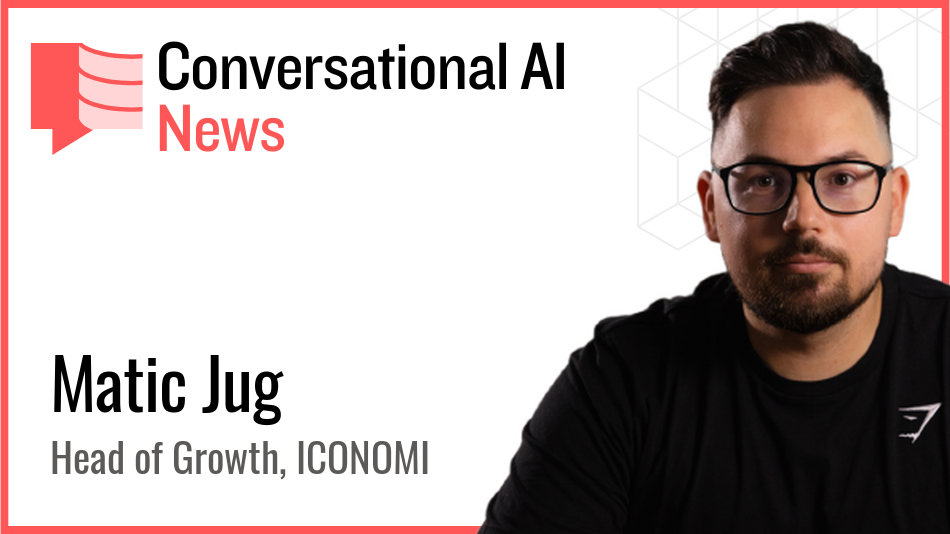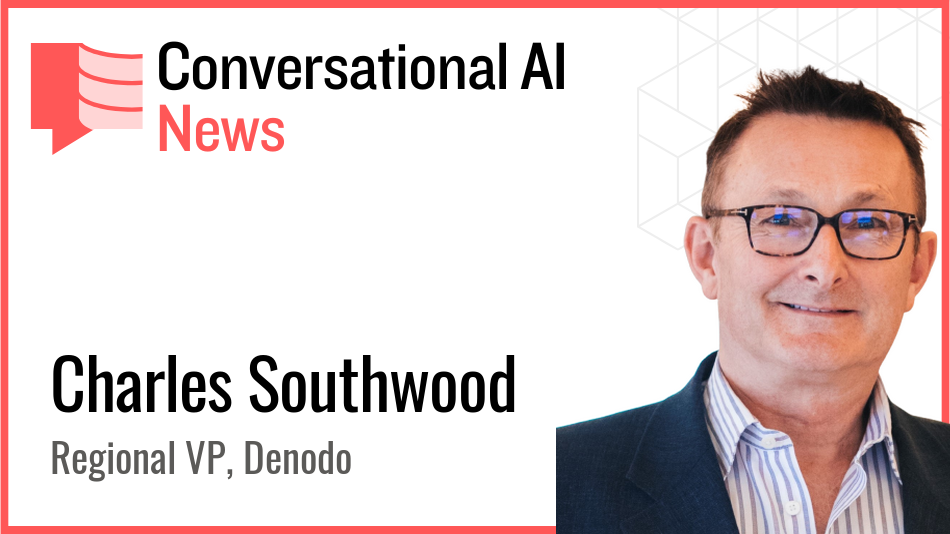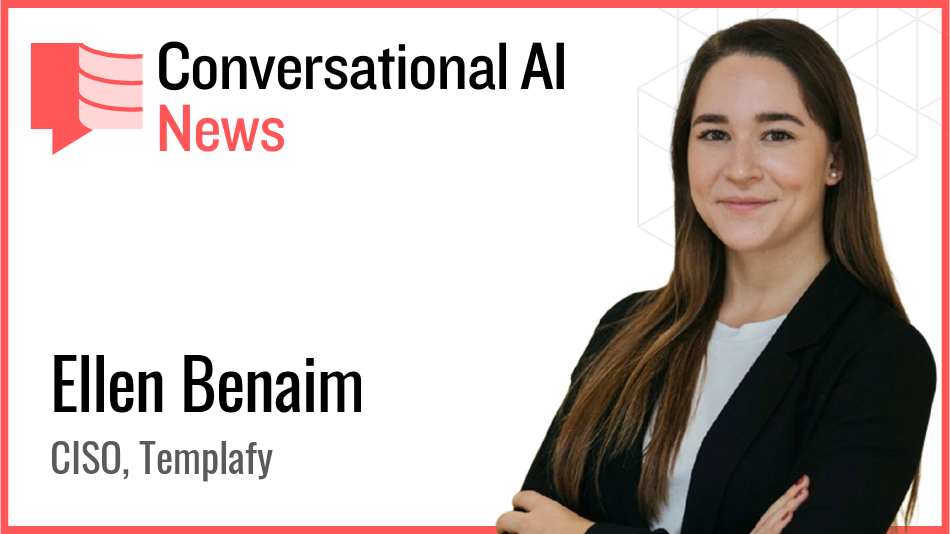How Moneypenny is Blending AI With Human Warmth

Today we're meeting Jesper With-Fogstrup, Group Chief Executive Officer at Moneypenny. His company specialises in delivering customer conversations using a unique blend of brilliant people and AI technology.
My wife has long been a very satisfied Moneypenny customer with one of the businesses she used to run – and likewise, at various points across the last decade, I've been a heavy user of Moneypenny. Before I moved to Denmark to work with Nordea Bank, I had my phone on permanent divert to my Moneypenny service – it was brilliant.
When I was on site with clients, it was often highly inappropriate for me to be answering other customer enquiry calls, so when the call went to Moneypenny, I always relaxed. A few seconds later I'd get the text and email with the details and then I could follow-up properly.
So I absolutely rate the Moneypenny service. How, though, are they aiming to complement the human warmth that I'd suggest they're rightly very well known for, with AI services? Let's hear from the Group CEO, Jesper.
Over to you Jesper - my questions are in bold:
Who are you, and what's your background?
I was born and raised in Denmark and spent part of my late teens as an exchange student in Michigan which sparked my interest in living abroad. Although I returned to Denmark to continue studying, I later moved to the UK for university - and nearly 30 years later, I'm still here.
Professionally I started my career in travel where I did 'digital transformations' before that label probably existed. I spent more than a decade in online travel and loved the pace and innovation. From there, I joined ComparetheMarket as COO – who doesn't love the meerkats?! My team and I helped evolve the brand into a digitally led, separately regulated entity that helped households save time and money.
After ComparetheMarket, I led global digital channels for HSBC during the years leading up to and during the pandemic. We focused on replicating the care and support typically found in a local branch, but at digital scale - making every customer interaction feel personal, relevant and contextually right.
Following that, I became CEO at Smoove, where we focused on making the home buying and selling journey easier, faster and more transparent. We successfully completed the public-to-private transition, ultimately exciting to PEXA.
Now at Moneypenny I am excited about our opportunity to partner with even more local, regional and global businesses to deliver conversations across both digital and voice channels. Moneypenny is a phenomenal business with wonderful people that are truly passionate about delivering the best, trusted, outcomes for our client's customers across industries and need states. And, we are just getting started. We recently launched a magical AI powered platform for our PA and Receptionists and are super excited about the AI Voice Agents we have launched, especially the potential for new and existing clients. The sweet spot is where great people meet great tech – that sweet spot is Moneypenny.
What is your job title, and what are your general responsibilities?
I am the Group Chief Executive Officer with Moneypenny. I consider my most critical responsibility being to help all of our teams to be their very best every day they show up. I am part coach and part Chief Unblocking Officer.
At Moneypenny we partner with our clients to deliver outstanding customer experience for their customers or other stakeholders. Our amazing PAs and Receptionists deliver exceptional experiences every day through calls, live chat and email – in fact any customer touchpoint. And now, we also have AI Voice Agents taking entire or parts of calls for our clients.
Can you give us an overview of how you're using AI today?
AI is increasingly embedded across our operation, from everyday tools optimizing performance in e.g. email handling, data analysis, marketing and sales operations – these categories feel increasingly 'business as usual'.
Where I think the AI magic happens in Moneypenny is also in the core of our operational platform capability. We now have Agents listening to calls and our real people can query AI powered knowledge bases to support them in being even better, delivering a personal, relevant and contextually right experience for our client's customers. I am super excited about the AI Voice Agents we recently launched. Especially the potential for new and existing clients. As an example – they are offering a superb alternative to IVR – the experience of pressing 1 for this and 2 for that. The sweet spot is where great people meet great tech – that sweet spot is Moneypenny. Our Agents now handle live calls, solve customer problems, and take messages for client's to handle. Most importantly, they know when a real person is needed and escalate the conversation seamlessly to one of our amazing people. We have great tech and great people working together.
Tell us about your investment in AI? What's your approach?
The business case for more back office tools is pretty straight forward – have the tools show us the upside and we will invest to execute faster and better for our customers.
For our core operational platform, the investment is more strategic. We build proprietary capabilities where it gives us long-term strategic value – particularly in platform architecture and client flexibility. Elsewhere, we partner with best-in-breed tools to accelerate our delivery. Our tech team has done a brilliant job moving fast while staying focused on what matters most to our clients.
What prompted you to explore AI solutions? What specific problems were you trying to solve?
Moneypenny is a clear leader in the UK where we serve mainly UK clients and also Australian and European clients, and we have an amazing opportunity to also grow faster in the US. Across markets whether we activate new demand or win over clients from our frenemies there is demand for efficiency. We always deliver on that with real people and increasingly with our AI Agents to handle especially repetitive, lower complexity tasks freeing up our real people to deal with the harder to do tasks. It's about creating a smart balance between technology and human interaction, which aligns perfectly with our brand and the evolving needs of our clients.
Who are the primary users of your AI systems, and what's your measurement of success? Have you encountered any unexpected use cases or benefits?
Primary users range from our client-facing teams using internal AI tools, to customers interacting directly with our AI Voice Agents.
We measure success using the same high standards we apply to human-delivered services: satisfaction, resolution rates, and response times. For AI-specific metrics, we look at completion rates, escalation rates, engagement, and operational performance. We're constantly learning, adapting, and optimizing.
What has been your biggest learning or pivot moment in your AI journey?
It continues to amaze me how fast we are moving making the customer experience increasingly better across our Agents. What they can do today, is fundamentally different to what they were capable of handling even a couple months ago. The speed at which we ship improvements and how this translates to better customer outcomes is great. I can only imagine how great this will be in two, three, six months from today.
How do you address ethical considerations and responsible AI use in your organisation?
Ethical handling is incredibly important to us every day and AI adds a dimension to that, an additional challenge to solve. We have a lot of regulated clients and AI adds both challenges to that, and also huge opportunities eg. It is easier to demonstrate compliance.
I have dealt with ethical dimensions of tech development for more than twentyfive years. AI adds an additional dimension, but it is not fundamentally different. I always start with an extreme customer focus, make sure you deliver against that and then check for unintended consequences.
What skills or capabilities are you currently building in your team to prepare for the next phase of AI development?
We're constantly building for what's next. Many of today's key roles didn't exist a year ago. At Moneypenny, we focus on internal mobility – helping people grow into new roles, gain new skills, and stay curious.
We hire people for potential, not just a job spec. That mindset keeps us agile and ready to move fast as AI evolves. And it keeps our people engaged and excited about the future.
If you had a magic wand, what one thing would you change about current AI technology, regulation or adoption patterns?
Really good question – I would say finding a better balance between ability and predictability. The tech is moving fast, but it's not always easy to predict performance or outcomes.
What is your advice for other senior leaders evaluating their approach to using and implementing AI? What's one thing you wish you had known before starting your AI journey?
Don't be afraid – be curious. That way you will miss less and understand more. This starting point will help you get more implemented sooner and learn as you progress what is relevant to your business.
What AI tools or platforms do you personally use beyond your professional use cases?
A lot! And so many tools we use daily are powered by AI, even if we don't think of them that way.
Some favourites include:
- Lovable – for fast, intuitive AI builds
- Perplexity – great for solid research-based answers
- NotebookLM – try upload your CV or content to explore how AI reads and interprets it …a bit self indulgent
- Synthesia – for AI video generation
- Claude – a really promising conversational AI and increasingly great at code
- Gemini – what Google just released at Google I/O 2025 is impressive
Experiment, explore, work better and faster, be entertained and create your own AI toolbox – it's worth it.
What's the most impressive new AI product or service you've seen recently?
One of the most impressive AI innovations I've encountered recently is Manus, an autonomous AI agent developed by the Chinese startup Monica. Manus is designed to independently handle complex online tasks without continuous human guidance. It can perform activities such as writing and deploying code, managing schedules, and analyzing stocks. Manus achieved a score of approximately 86.5% on the GAIA benchmark, surpassing other models like H2O.ai's h2oGPTe Agent and OpenAI's DeepResearch. Its ability to operate asynchronously in the cloud and its transparent process display make it accessible to users regardless of coding experience. While it faces challenges like system stability under high demand, Manus represents a significant step toward more autonomous and capable AI agents.
I also really like Loveable and Claude 4.0 for their straightforward and super-fast coding experience ability.
It feels like the world will center on similar builds and designs meaning that the real differentiator will be people and brand as the foundation for building trust.
Finally, let's talk predictions. What trends do you think are going to define the next 12-18 months in the AI technology sector, particularly for your industry?
Agentic AI becomes mainstream
Tools will shift from passive prompts to autonomous agents that take multi-step actions across platforms. Tools like OpenAI's AutoGPT and emerging platforms like Manus are early signs – we'll see much more focus on orchestration, autonomy, and real-world use cases. Implementing API connectivity between two systems with JSON will never be the same again – the agentic layer is super exciting.
Vertical specialisation
Domain-specific AI will deliver real value – especially in CX, law, healthcare, and finance. Companies will increasingly build tailored AI stacks, integrating foundation models with proprietary data and processes.
Human-AI collaboration, not replacement
We'll see more hybrid models where AI enhances human work, not replaces it. The best products will be those that combine automation with a strong human-in-the-loop design – especially in service, support, and creative fields. Folks don't want to talk to computers with no empathy – they want AI for speed and human for context.
Regulation, transparency, and trust
As AI systems become more embedded in daily life, expectations for transparency, explainability, and ethical guardrails will increase. Regulation is coming, and businesses that get ahead of it – with strong governance, integrity and responsible AI practices – will win trust. Trust is the foundation for success.
AI at the edge
We'll see more real-time, on-device AI, especially with the next wave of AI-enabled hardware – from smartphones to wearables. This will open up new use cases in personalisation, health monitoring, and private, low-latency AI interactions.
It's a super exciting time – reminiscent of the mid to late '90s in terms of pace and possibility. The challenge is turning hype into real value, responsibly, and turning capability into meaningful value for people and businesses.
Thank you very much, Jesper!
Read more about Jesper on LinkedIn and find out more about Moneypenny at www.moneypenny.com.
You can read more about Moneypenny on the Conversational AI Marketplace.














